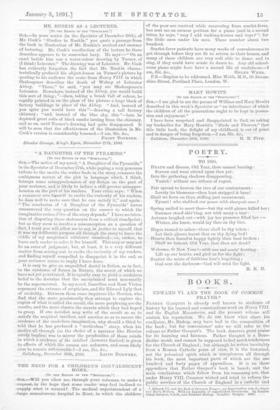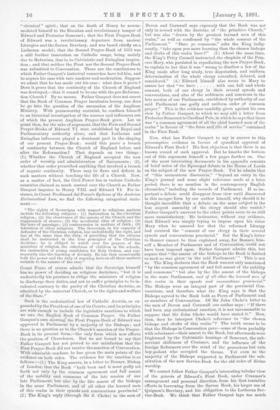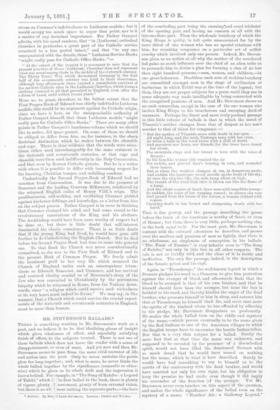BOOKS.
EDWARD VI. AND THE BOOK OF COMMON PRAYER.*
FATHER GASQUET is already well known to students of history by his learned and conscientious work on Henry VIII. and the English Monasteries, and the present volume will sustain his reputation. We do not know what share his coadjutor, Mr. Bishop, may have had in the composition of the book ; but for convenience' sake we will refer to the volume as Father Gasquet's. The book deserves great praise for its learning and fairness. Father Gasquet is a Bene- dictine monk, and cannot be supposed to feel much tenderness for the Church of England ; but although he writes inevitably from a Roman Catholic point of view, it is the historical, not the polemical spirit which is conspicuous all through his book, the most important parts of which are the one hundred and forty pages of appendices. It is on these appendices that Father Gasquet's book is based; and the main conclusions which follow from his reasoning are, that under Henry VIII. Crammer wished and tried to reform the public services of the Church of England in a catholic and Edward VI. and tho Book of Common ,l'rayer r au Examination into its Origin and Early History. With an Appendix of unpublished Documents, By Francis Aldan 4asquet, 0,S.B., and Edmund Bishop. London : Hodges. 1880.
" eirenical " spirit ; that on the death of Henry he accom- modated himself to the Erastian and revolutionary temper of Edward and Protector Somerset ; that the First Prayer-Book of Edward was a revolutionary departure from ancient Liturgies and the Sarum Breviary, and was based chiefly on a Lutheran model ; that the Second Prayer-Book of 1552 was a still further innovation on Catholic usage, being mainly due to Helvetian, that is, to Calvinistic and Zwinglian inspira- tion; and that neither the First nor the Second Prayer-Book was submitted to Convocation. These are the conclusions to which Father Gasquet's historical researches have led him, and he argues his case with rare candour and moderation. Suppose we admit that he has made out his case : what does it prove P Does it prove that the continuity of the Church of England was destroyed,—that it ceased to be one with the pre-Reforma- tion Church ? By no means. Father Gasquet does not assert that the Book of Common Prayer inculcates heresy, nor does he go into the question of the succession of the Anglican Ministry. With praiseworthy restraint, he confines himself to an historical investigation of the sources and influences out of which the present Anglican Prayer-Book grew. Let us grant then, for the sake of argument, that the First and Second Prayer-Books of Edward VI. were established by Royal and Parliamentary authority alone, and that Lutheran and Zvvinglian influences played a dominant part in the shaping of our present Prayer-Book : would this prove a breach of continuity between the Church of England before and -after the Reformation ? That depends on two things : (1), Whether the Church of England accepted the new order of worship and administration of Sacraments ; (2), whether that order prescribed anything that involved a breach of organic continuity. There may he flaws and defects in such matters without touching the life of a Church. Now, as a matter of fact, the Civil Power has in various Catholic countries claimed as much control over the Church as Father Gasquet imputes to Henry VIII. and Edward VI. For in. stance, in Count Ferdinand dal Pozzo's Epitome of the Austrian Ecclesiastical Law, we find the following categorical state- ment :- "The rights of Sovereigns with respect to religious matters include the following subjects : (1) Instruction in the Christian religion ; (2) the observance of the canons of the Church and the suppression of abuses ; (8) the accidental rites of religion ; (4) the laws of marriage ; (5) controversies in matters of faith ; (6) toleration of other religions. The Sovereign, in his capacity of defender of the Christian religion, has undoubtedly the right, and has at the same time the duty, of providing that the citizens shall be instructed in the true principles of the Christian doctrine : he is obliged to watch over the prayers of the ministers of religion, the catechism of children in the schools, the instruction of young candidates for Holy Orders, and con- sequently also the teaching of divinity. He has then occasionally both the power and the duty of enacting laws on all these matters suitable to the nature of the case."
Count Pozzo of course admits that the Sovereign himself has no power of deciding on religious doctrines ; " but it is undoubtedly his province to oblige the ministers of religion to discharge their duties, and not to suffer principles to be in- culcated contrary to the purity of the Christian doctrine, as admitted by the universal Church, or to the rights and welfare of the State."
Such is the ecclesiastical law of Catholic Austria, as ex- pounded by the President of one of its Courts; and its principles are wide enough to include the legislative sanctions to which we owe the English Book of Common Prayer. On Father Gasquet's own showing; the First Prayer-Book of Edward was approved in Parliament by a majority of the Bishops ; and there is no question as to the Church's sanction of the Prayer- Book in its present form,—the only form which now affects the position of Churchmen. But we are bound to say that Father Gasquet has not proved to our satisfaction that the First Prayer-Book did not receive the sanction of Convocation. With admirable candour, be has given the main points of the evidence on both sides. The evidence for the sanction is as follows :—(1.) The King asserts, in a letter to Bonner, Bishop of London, that the Book " hath. been and is most godly set forth not only by the common agreement and full assent of the nobility and commons of the late session of our late Parliament, but also by the like assent of the bishops in the same Parliament, and of all other the learned men of this realm in their synods and convocations provincial." (2.) The King's reply (through Sir J. Cheke) to the men of Devon and Cornwall says expressly that the Book was not only in accord with the doctrine of "the primitive Church," but was also "drawn by the greatest learned men of this realm," as well as confirmed by "the whole consent of the Parliament." "Dare ye commons," asks the King inclig- na,ntly, "take upon you more learning than the chosen bishops and clerks of this realm have P" (3.) About the same time, the King's Privy Council instructed the chaplain of the Prin- cess Mary, who persisted in repudiating the new Prayer-Book,, to explain to her that it was "wrong to disallow a law of the King made after long study, true disputation, and uniform determination of the whole clergy consulted, debated, and considered." (4.) Edward himself also wrote to Mary to assure her that "we have with one full and whole consent, both of our clergy in their several synods and convocations, and also of the noblemen and commons in the' late session of our Parliament, established by authority of our- said Parliament one godly and uniform order ,of common prayer." This is the evidence candidly given against his own view by Father Gasquet, to which we may add a letter from Protector Somerset to Cardinal Pole, in which he says that there was "a common agreement of all the chief learned men of the realm" in favour of "the form and rite of service" contained, in the First Book.
Now, what has Father Gasquet to say in answer to this presumptive evidence in favour of synodical approval of Edward's First Book P His first objection is that there is no. known record of such approval. But he knocks the bottom out of this argument himself a few pages further on. One of the most interesting documents in his appendix consists- of brief notes of the Episcopal debate in the House of Lord& on the subject of the new Prayer-Book. Yet he admits that of "this momentous discussion," "beyond an entry in the King's journal and some slight reference made at a later period, there is no mention in. the contemporary English- chronicles," including the records of Parliament. If so im- portant a debate could disappear from view until discovered in this meagre form by our author himself, why should it be thought incredible that a debate on the same subject in the less august assembly of the clergy should also vanish P' Father Gasquet's answers to the other points seem to us still more unsatisfactory. He insinuates, without any evidence, that Edward was simply trying to impose upon his sister Mary when he assured her that the reformed Litnrgy had received the "consent of our clergy in their several synods and convocations provincial," But the King's letter- to Bonner cannot be thus explained away, for Bonner, him- self a Member of Parliament and of Convocation, could not have been imposed upon. Father Gasquet admits this, but argues that the assent of the bishops to the Book is limited; to such as was given 'in the said Parliament,'" This is not so. The King declares that the Book was not only sanetiona "by the common agreement of and full assent of the nobility and commons,"" but also by the like assent of the bishop& in the same Parliament, and of all other the learned men of' this realm in their synods and convocations provincial.' The Bishops were an integral part of the provincial Con- vocations, 'and therefore what the King says is that the Bishops agreed to the Book both as Peers of Parliament and as members of Convocation. Of Sir John Cheke's letter to. the men of Devon and Cornwall our author says : "If there- had been any ecclesiastical sanction, it is not unreasonable to- suppose that Sir John Choke would have stated it." How, then, does he interpret Choke's reference to "the chosen bishops and clerks of this. realm "P The truth seems to be that the Bishops in Convocation gave—some of them probably with reluctance—their assent to the Book, but afterwards were' frightened by the Calvinistic leanings of Somerset, the sub- servient shiftiness of Cranmer, and the influence of the foreign Reformers over the mind of the precocious but vain, boy-pedant who occupied the throne. Yet even so the majority of the Bishops supported in Parliament the sub- stitution of the new Service-Book for the old order of divine worship.
We cannot follow Father Gasquet's interesting tabular view of the genesis of Edward's First Book, under Grammes'& management and personal direction, from his first tentative efforts in borrowing from the Sarum Book, his larger use of Quignon's Breviary, and his obligation to the Lutheran Ser- vice-Book. We think that Father Gasquet lays too muds stress on Cramner's indebtedness to Lutheran models ; but it would occupy too much space to argue that point, nor is it a matter of any doctrinal importance. For Father Gasquet admits, with his usual candour, that "in [Lutheran] cathedral churches in particular, a great part of the Catholic service remained to a late period intetet," and that "to any one unacquainted with the details, these" Lutheran Service-Books " might easily pass for Catholic Office-Books "At the outset of the inquiry it is necessary to note that the present practice of .those [Lutheran] Churches does not represent what was usual among them in the middle of the sixteenth century. The Thirty Years' War which devastated Germany in the first half of the seventeenth century was fatal to their observance, although long afterwards there existed a remarkable survival of the ancient Catholic rites in the Lutheran Churches, which forms a striking contrast to all that prevailed in England, even after the raform of Laud, until within recent years."
Were we to grant, therefore, to the fullest extent that the First Prayer-Book of Edward was chiefly indebted to Lutheran models, this would be no argument against its Catholic origin, since we have it here, on the unimpeachable authority of Father Gasquet himself, that those Lutheran models 'might easily pass for Catholic Office-Books." There are many other points in Father Gasquet's handsome volume which we should like to notice, did space permit. On some of these we should be obliged to differ from him, as, for instance, in the sharp doctrinal distinction which he makes between the chasuble and cope. There is clear evidence that the words were some- times either used interchangeably for the same vestment in the sixteenth and seventeenth centuries, or that cope and chasuble were then used indifferently in the Holy Communion, and that even by Roman Catholic priests. But he is a writer with whom it is possible to differ with increasing respect for his learning, Christian temper, and unfailing candour.
Undoubtedly the Second Prayer-Book of Edward had no sanction from Convocation. It was due to the pressure of Somerset and the leading Genevan Reformers, reinforced by the returned English exiles of Henry VIII.'s reign. The pusillanimous, self-seeking. and vacillating Cranmer yielded against his better fetlings and knowledge, as a letter from him on the subject proves. Father Gasquet is in error in thinking that Cranmer changed his mind, and had come round to the revolutionary innovations of the King and his abettors. The Archbishop would have been more worthy of respect had he done so ; but there is little doubt that self-interest dominated his elastic conscience. There is as little doubt that if the young King had lived, he would have gone still further in de-Catholicising the English Church. But he died before his Second Prayer-Book had time to come into general use. To that Book the Church was never constitutionally committed, as she was to the First Book of Edward and to the present Book of Common Prayer. We freely admit the imminent peril to her very life which menaced the Church of England under such an unscrupulous trium- virate as Edward, Somerset, and Cranmer, and her survival and restored vitality remind us of Boccaccio's story of the Jew who was converted to Christianity by the portentous iniquity which he witnessed in Rome, from the Vatican down- wards, since "a religion which could survive such wickedness at its very heart must indeed be divine." We may say, in like manner,' that a Church which could survive the crucial experi- ments of the sixteenth and seventeenth centuries in England, must be more than human.
















































 Previous page
Previous page